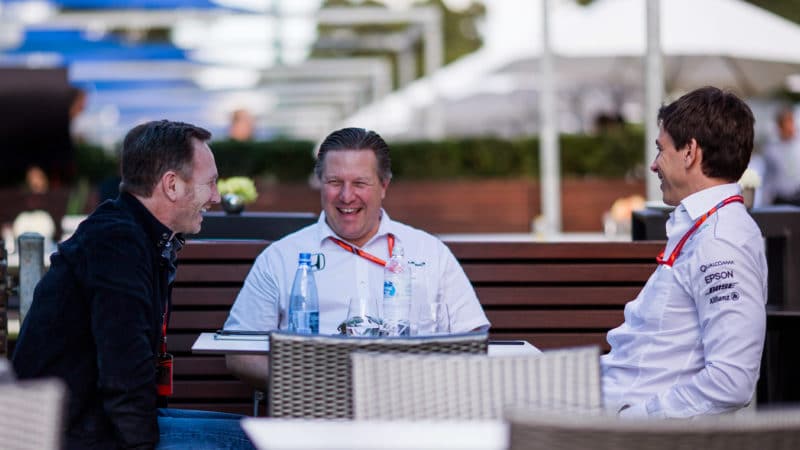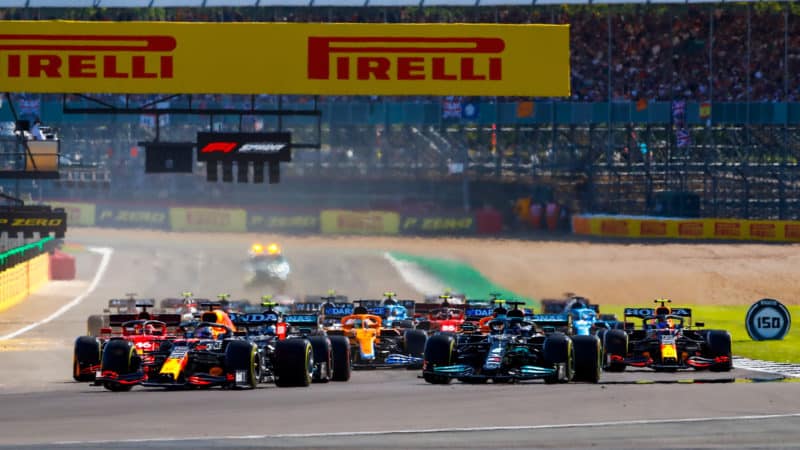Not timing because he was going to speak to the press later that day and build on it – though he did – but timing because the FIA is potentially at a crossroads as Mohammed Ben Sulayem begins his tenure as president.
And while you have to take what any senior team member says with at least a pinch of salt (there’s always going to be at least a modicum of self-interest, though that could still be for the greater good), it really does appear that Brown is keen to highlight the major problems that still exist in his view, and isn’t worried about who he might upset.
It’s not like he hasn’t done it before. In fact, it’s not at all unusual for Brown to post such comments on the McLaren website in the same way he speaks freely at race events, but he was clearly feeling empowered to say what he thinks at a time when it can gain traction.
Brown has always taken every opportunity to try and wind up Christian Horner and Red Bull, and those moments have been embraced even more since McLaren became a Mercedes customer once again, but it appeared Mercedes wasn’t totally immune to the criticism either as the American spoke about the cost cap requests from the biggest spenders.
When we got to push Brown on the topic a little more, there was one clear team in his mind when it came to budgets, but he was also exasperated by the control teams still have and the conflict of interest that can create.
“I see some other teams voting against their best interests solely because of political pressure.”
“There is constantly in these meetings some teams that take the opportunity to do a land grab to raise the budget, even when it makes no sense,” Brown explained. “If I focus on the Sprint – which is just an example of many examples – when Ross [Brawn] presented that the first time around, they did a study: ‘We’ve picked these tracks because we think they’re good race tracks, but also because we’ve looked at first lap incidents etc’ and it was a lot smaller than you’d think.
“I might have my numbers a little bit wrong here but one had no incidents, one had 1.2 incidents… it was pretty negligible. Then they bring forward the results of the three Sprint races which are actually very consistent with what data they had shown us.
“And yet a couple of teams – and one team in particular – wanted a $5million budget cap increase, which was just ridiculous. And no rational facts behind it. When you challenged those facts they then go to ‘Yeah but what if’, ‘it could’, ‘you’ve got to anticipate’ – it’s just nonsense.
“Formula 1 showed us that the Sprint races worked from an increase in fan viewership and an increase in sponsorship – both of which are very good for all of us in the sport. But because of the governance and voting on certain things and whether [the majority needed] is five or it’s eight depending on the time of year and what category it falls into, when you have to get eight out of ten votes, that’s pretty hard to get through because then when you get into your A and B team situation, all you really need is one of those teams to be against it and it falls down.”

Brown takes every opportunity to wind up Horner (left) and says that Toto Wolff (right) has never pressurised him to vote in Mercedes’ favour
Peter J Fox/Getty Images
When we think of A and B teams, there’s the obvious Red Bull and AlphaTauri ownership structure, but also the Ferrari-Haas tie-up (plus Alfa Romeo deal) and close links between Mercedes and Aston Martin. But in a hint as to where his dissent stems from, when I pressed Brown on the past year as a Mercedes customer he insisted he has never had any pressure from Toto Wolff’s team to vote a certain way.
“No, Mercedes has never put any pressure on us. Andreas [Seidl] and I are a very independent team. They know that. Of course, when and where it makes sense for us to be aligned with them of course we are, but we would never do what I see some other teams doing which is vote for something which is clearly not in your best interest and they’re solely doing that because of political pressure.”
Brown wants that to change, and he wants it to change quickly, as it continues to lead to an impasse on the terms of the Sprint this year. To get change in governance is going to be tough, however, because while he insists he has “a lot of confidence in Mohammed”, it’s not as easy as the FIA president implementing a new structure. Despite his strong approach, Brown needs allies onboard who are all willing to give up some control.
“If we do what’s right for the sport then everything will be better for all of us.”
“Formula 1 and the FIA don’t have any conflicts of interest, and the teams do. Normally in any business environment, conflicts of interest need to recuse themselves from votes and board meetings. So when we’re having a board meeting if you like around the state of Formula 1, and we’re voting, and you have a table with a lot of conflicted individuals, that needs to be removed or you get what we get from time to time.
“I’d like to see Stefano [Domenicali] and Mohammed listen to us and be empowered to make more decisions, but under the current governance that means the teams need to vote to allow that to happen. Which brings me back to a challenge. Now, the governance now is better than it was pre-Liberty – it’s gone the right way – but I’d still like to see more.
“And that means sometimes things might not fall our way, but I’m a believer that if we do what’s right for the sport then everything will be better for all of us.”
Sounds simple, but the cycle of the majority of teams needing to all agree to approve such changes means there’s every chance Brown is having the same rant in a year’s time, and if you agree with him then that would probably highlight the need for change even more.


